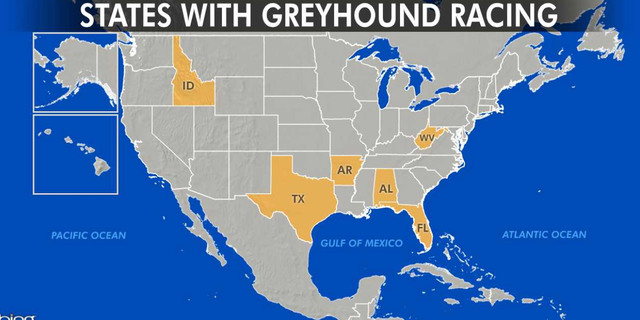Greyhound racing ban in Florida leaves uncertainty for dogs
Dog racing may now be banned in Florida but that doesn’t mean the war over greyhounds is over. Pro-racing activists now say groups that supported the ban should not have a say over where the dogs go once they retire.
PALM BEACH, Fla. – Dog racing may now be banned in Florida, but that doesn’t mean the war over greyhounds is over.
The fate of more than 7,000 race dogs that will soon find themselves unemployed has sparked a major battle in the Sunshine State.
On one side are animal activists, who successfully pushed a state referendum to end greyhound racing and want the specially bred dogs to be put up for adoption and become family pets. On the other side are greyhound organizations and Florida tracks that want to continue racing the agile breed until the January 1, 2021 deadline or send them to states that still allow dog racing.
According to the National Greyhound Association, more than 100 adoption groups across the country are prepared to take in the retired racing dogs. But, as the deadline slowly nears, battle lines are being drawn over who has a say in their futures.
“It’s the owners of the dogs—they will tell us if they want the dog back either for breeding, or if they want to have it for a pet for themselves or if it’s OK for us to contact an approved adoption group,” said Kurt Trzecika, a greyhound racing trainer at The Palm Beach Kennel Club, which maintains over 1,000 greyhounds.

Because racing won’t be illegal in the state for another 25 months, some tracks plan to keep racing until the end of 2020, while others have already called it quits.
(Fox News)
Pro-racing activists say groups that supported a ban should not have a say over where the dogs go.
“This is what the dogs are born to do…this is what they love to do,” said Barbara Masi, president and founder of Awesome Greyhound Adoptions, a pro-racing group partnered with a program called Hounds & Heroes, which trains retired racers to be service dogs for veterans in need after their time at the track.
But animal activists say that Florida voters had their say – and greyhounds should now be retired and living as family pets.
“The mass breeding is going to end, the injuries are going to end, the deaths are going to end,” said Sonia Stratemann, president of Elite Greyhound Adoption. “This is the best thing that’s happened for the breed in years.”
Amendment 13, which needed 60-percent approval to become law, passed with nearly 70 percent support in the otherwise divided state, hitting an industry already in decline. About 50 greyhound tracks have closed nationally in the past 30 years because of the increased popularity of poker rooms, online gaming and simulcasting, which allow customers to watch and bet on live dog and horse races.
Still, greyhound racing remains profitable, raking in millions of dollars a year nationally. In Florida alone, the industry made $200 million in 2017 and employed 3,000 people.
Stratemann said the racing industry is only thinking of cashing in on the dogs, and not as concerned about the animals’ future.
“Jobs…that is really what everybody is clinging onto,” said Stratemann, who runs a dog sanctuary on her farm in Loxahatchee, Fla., where retired racers can live until they find a permanent home. “It really has nothing to do with the dogs. They’re not breeding them for health and longevity. They’re breeding them for speed as a young dog.”

The Sunshine State has more racing greyhounds than any other and is home to 11 of the nation’s 17 active dog tracks in five other states: Alabama, Arkansas, Idaho, Texas and West Virginia.
(Fox News)
The Sunshine State has more racing greyhounds than any other and is home to 11 of the nation’s 17 active dog tracks in five other states: Alabama, Arkansas, Idaho, Texas and West Virginia.
Because racing won’t be illegal in the state for another 25 months, some tracks plan to keep racing until the end of 2020, while others have already called it quits, prompting some dogs to be sent to other Florida tracks or out of state to continue competing.
But both sides expect a gradual shutdown of the industry over the next two years.
“We’ll be racing until December 31, 2020,” said Trzecika. “It’ll be a gradual phase-out, but all the dogs will be spoken for.”
Source: Read Full Article
